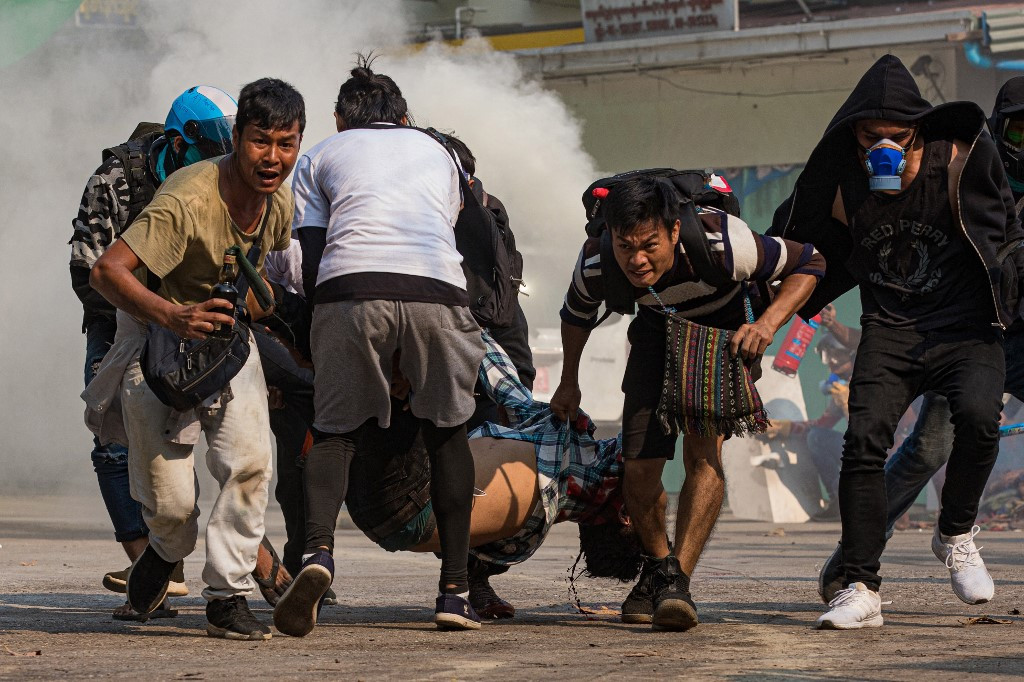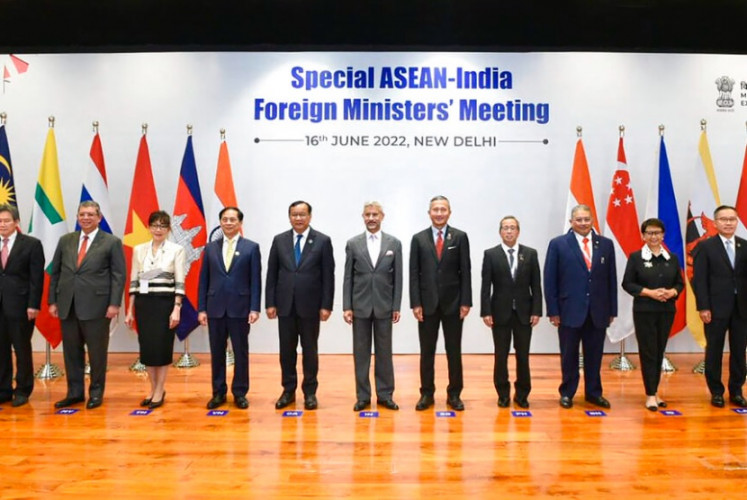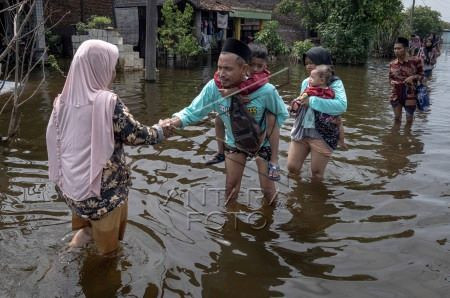We must stop mass atrocities in Myanmar – now
The cardinal principle of non-interference among member states needs to be recalibrated if the grouping wants to be seen as respecting all of the principles described in the ASEAN Charter,
Change Size
 Protesters carry a wounded man shot with live rounds by security forces during a crackdown on demonstrations against the military coup in Yangon, Myanmar, on March 17. (AFP/Stringer)
Protesters carry a wounded man shot with live rounds by security forces during a crackdown on demonstrations against the military coup in Yangon, Myanmar, on March 17. (AFP/Stringer)
H
umanity has apparently failed to learn important lessons from the past about mass atrocities. Atrocity crimes still continue even as states also fail to ensure the protection of civilians amid outbreaks of violence.
This is particularly egregious in light of the myriad commitments made by member states of the United Nations, which vowed to “never again” stand idly by in the face of mass atrocity crimes after the adoption of the Responsibility to Protect (R2P) norm at the UN World Summit of Leaders in 2005.
Following the Feb. 1 coup, I have followed the ongoing suffering of the people of Myanmar with a heavy heart. However, I believe that it is not too late for further atrocities to be prevented.
After the Khmer Rouge took power in 1975, at least 1.7 million innocent civilians died from starvation, torture, execution and forced labor during Pol Pot’s reign of terror over Cambodia. During that time, there was no such thing as R2P.
Over the last two decades, Cambodia has pursued international standards of justice – establishing the Extraordinary Chambers in the Court of Cambodia (ECCC) for the prosecution of crimes committed during the Khmer Rouge era. With support from the UN, this hybrid court, commonly known as the Khmer Rouge Tribunal, was established to bring justice and accountability to the victims of mass atrocities, while unveiling the truth as to what occurred during the Khmer Rouge regime, and to deter future atrocities.
This judicial process seeks to assist Cambodia to deal with its dark history while looking forward to a more peaceful, stable and developed society in the future. The trial of top Khmer Rouge leaders demonstrates the sincere political commitment from the Cambodian government to bring to justice the perpetrators of those crimes.
We should not fail to acknowledge the international community’s genuine commitment to assisting the Cambodian government in the fulfillment of its responsibility to protect by bringing about real justice. With a strong determination to stop atrocity crimes from re-occurring and strengthening capacity building, the Cambodian government and the international community have rendered correct credibility to the R2P norm.
The military coup in Myanmar shocked those of us who thought that the country had ushered in a new era of democracy and a return to civilian rule. However, we underestimated the mindset of the Tatmadaw, which today is engaged in the mass slaughter of its own people.
By early April, more than 550 people have been killed in the anticoup unrest, with airstrikes and bombing on March 27-30 causing even more deaths, including women and children, and air raids sending thousands of refugees to neighboring Thailand. The use of excessive force by the Tatmadaw against innocent civilians constitutes mass crimes in the 21st century.
The political crisis in Myanmar, which was triggered by the coup, has raised serious questions about the role of governments, ASEAN and the international community in stopping further atrocities in the country. Should intervention be considered to prevent the country from sinking deeper into the mass violence as the Tatmadaw continues to commit atrocity crimes?
The return of Tatmadaw rule in Myanmar raises fresh fears as to whether state actors, as well as regional and international institutions, can respond effectively to the crisis. Whatever the response, the crisis in Myanmar will invariably have long-term impacts not just for Myanmar but also the future of global and regional governance and international norms with regard to the role of the military in state governance, including protection of civilians.
Brunei as the chairman of ASEAN has called for “dialogue, reconciliation and the return to normalcy in accordance with the will and interests of the people of Myanmar”. Among the member states of ASEAN, Indonesia expressed concerns over developments in Myanmar and called for adherence to the “principles of democracy and constitutional government”. Cambodia, Thailand and Laos PDR, have said it is an "internal matter".
The people of Myanmar expect the international community to impose sanctions and have called on the UN to send peacekeepers as they demand that the Tatmadaw restore the civilian government of Ang San Suu Kyi. Inside Myanmar, there have also been calls to intervene through R2P so as to ensure both a halt to the violence and to bring the perpetrators to justice.
The most significant challenge to intervention is the unwillingness of individual states and the lack of consensus at the regional and international levels to take appropriate and timely action. In light of this reality, ASEAN’s future relevance is now at stake.
The cardinal principle of non-interference among member states needs to be recalibrated if the grouping wants to be seen as respecting all of the principles described in the ASEAN Charter, especially those pertaining to adherence to the protection of human rights, rule of law, good governance and international humanitarian law.
ASEAN must be resolute and united to exert maximum pressure on the Tatmadaw to stop the violence and use of lethal weapons against unarmed civilians, agree to an immediate cease-fire and engage in dialogue with all domestic stakeholders. Absent this, a military-ruled Myanmar is risking expulsion or at least suspension of membership in ASEAN.
Concomitantly, ASEAN should apply the norm of R2P and request the UN Security Council (UNSC) to enact R2P’s Pillar 3 to intervene decisively and in a timely to prevent further slaughter, given that the junta in Myanmar has manifestly failed in preventing further atrocities since the coup. Only then can ASEAN be seen as a credible organization in promoting a community of caring and sharing societies, as well as a true champion of protection of civilians.
Cambodia has an important role to play in promoting R2P and the prevention of mass atrocities in Southeast Asia, given our own unique experience. The scope of peace-making diplomacy and prior investment in the judicial system to create the ECCC translates today into a sense of state obligation to protect its citizens from mass crimes.
Thus, Cambodia should find itself in a unique position to take the lead to organize informal dialogues among ASEAN member states to discuss the situation of Myanmar in the context of ASEAN’s declarations and statements that are related to the principle of the R2P with a view to helping Myanmar to restore normalcy and stop human suffering.
***
The writer is executive director of the Cambodian Institute for Cooperation and Peace (CICP) and former Cambodia National R2P Focal Point.








